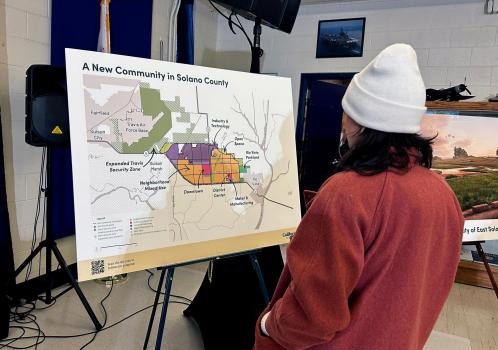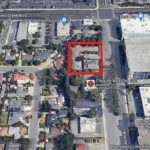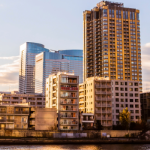By JANIE HAR | Associated Press
SAN FRANCISCO — A wealthy Silicon Valley-backed campaign to build a green city for up to 400,000 people in the San Francisco Bay Area has submitted what it says are enough signatures to qualify the initiative for the November election.
The campaign submitted more than 20,000 signatures but would need only about 13,000 valid ones to qualify for the ballot. If verified by Solano County’s elections office, voters will decide in the fall whether to allow urban development on land currently zoned for agriculture. The land-use change would be necessary for the development to be built.
Jan Sramek, a former Goldman Sachs trader who heads the company behind the campaign, California Forever, said at a news conference Tuesday that he heard from thousands of people who want careers and homes in the county where they grew up but can no longer afford to live there because of high housing costs and a lack of nearby work.

“They are fed up with this malaise that’s plagued California for the last 20 years with this culture of saying no to everything that has made it increasingly impossible for working families to reach the California dream,” he said.
The yet-unnamed development would mix homes, green space, a walkable downtown and jobs between Travis Air Force Base and the Sacramento River Delta city of Rio Vista.
The controversial project has wealthy and powerful backers, including philanthropist Laurene Powell Jobs and venture capitalist Marc Andreessen. It also faces strong opposition by some elected officials and other critics who say Sramek’s plan is a speculative money grab that’s light on details.
Sramek outraged locals by quietly purchasing more than $800 million in farmland since 2018 and even suing farmers who refused to sell. Reps. John Garamendi and Mike Thompson, who oppose the project, were initially alarmed that foreign adversaries or investors might be buying up the land because of its proximity to the Air Force base.
Sramek unveiled plans for the development in January, but had to amend the land-use change ballot initiative twice to address county and Air Force concerns. The delays haven’t slowed the project’s timeline.
The proposal includes an initial $400 million to help residents and Air Force base families buy homes in the community or for new affordable housing.
California is desperate for more housing, but critics of the project say it would be more environmentally sound to build within existing cities than to convert designated farmland.
This post was originally published on 3rd party site mentioned in the title of this site





